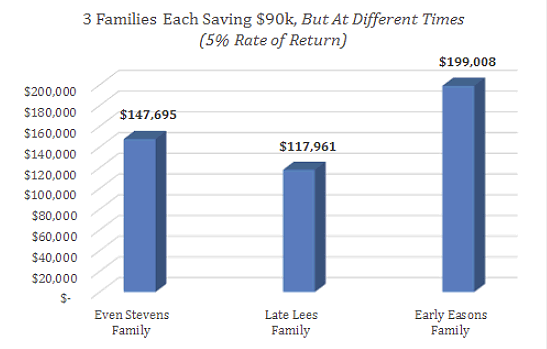The Best College Savings Strategy to Use
A 529 college savings plan comes with many advantages, and the best way to harness its power is to start ASAP and front-load your contributions.


Profit and prosper with the best of Kiplinger's advice on investing, taxes, retirement, personal finance and much more. Delivered daily. Enter your email in the box and click Sign Me Up.
You are now subscribed
Your newsletter sign-up was successful
Want to add more newsletters?

Delivered daily
Kiplinger Today
Profit and prosper with the best of Kiplinger's advice on investing, taxes, retirement, personal finance and much more delivered daily. Smart money moves start here.

Sent five days a week
Kiplinger A Step Ahead
Get practical help to make better financial decisions in your everyday life, from spending to savings on top deals.

Delivered daily
Kiplinger Closing Bell
Get today's biggest financial and investing headlines delivered to your inbox every day the U.S. stock market is open.

Sent twice a week
Kiplinger Adviser Intel
Financial pros across the country share best practices and fresh tactics to preserve and grow your wealth.

Delivered weekly
Kiplinger Tax Tips
Trim your federal and state tax bills with practical tax-planning and tax-cutting strategies.

Sent twice a week
Kiplinger Retirement Tips
Your twice-a-week guide to planning and enjoying a financially secure and richly rewarding retirement

Sent bimonthly.
Kiplinger Adviser Angle
Insights for advisers, wealth managers and other financial professionals.

Sent twice a week
Kiplinger Investing Weekly
Your twice-a-week roundup of promising stocks, funds, companies and industries you should consider, ones you should avoid, and why.

Sent weekly for six weeks
Kiplinger Invest for Retirement
Your step-by-step six-part series on how to invest for retirement, from devising a successful strategy to exactly which investments to choose.
If you’re a parent, you’ve undoubtedly wondered how you should save for your kids’ college educations … and how much you need to save.
With the cost of college only continuing to rise at a clip that outpaces inflation, we can expect higher education to require a hefty amount of money in the future. The best strategy you can use to be prepared for this reality is to start saving as early as you can — and don’t get caught playing catch-up later on.
Leverage a 529 Plan for College Savings
One of the best places to stash cash earmarked for college costs is within a 529 plan. The money you contribute here can grow and be used tax-free when your kids go to school (as long as the money is spent on qualifying education expenses).
From just $107.88 $24.99 for Kiplinger Personal Finance
Become a smarter, better informed investor. Subscribe from just $107.88 $24.99, plus get up to 4 Special Issues

Sign up for Kiplinger’s Free Newsletters
Profit and prosper with the best of expert advice on investing, taxes, retirement, personal finance and more - straight to your e-mail.
Profit and prosper with the best of expert advice - straight to your e-mail.
Because they’d need a Social Security number, your children need to be born before you can start using a plan; you can’t contribute before you have kids, or even while pregnant. (Note that, technically, if you’re determined to start saving before you start a family, there is one way around it: You can open account with yourself as the beneficiary, and then later switch it to your child.)
As soon as your children arrive in the world, I’d recommend setting aside a small amount of money each month into a 529 plan for them.
Why? Compounding! If you start when your child is born, that gives you 18 years to save. Many parents read that and feel they have plenty of time — but if you wait, you give yourself an uphill battle when it comes to saving enough.
Here’s the thing: Compounding returns is what will allow you to save less every month as long as you save longer. If you start when your child is young, it will be easier to generate the money needed to pay for college costs.
The more money you put in earlier the more time it has time to compound!
Why You Should Front-Load Your College Savings Accounts
Time is arguably your biggest advantage as an investor, because more time leads to increased compounding. Not convinced? Let’s look at a specific example with real numbers.
Imagine that three families all contribute the same amount of cash, $90,000, to their child’s 529 plan over 18 years — but they contribute the money at different times.
Family 1 (we’ll call them the Even Stevens Family) contributes $5,000 per year to a 529 plan.
Meanwhile, Family 2 (who we’ll call the Late Lees Family) contributes $1,000 per year in first five years. They gradually increase their contributions over time as college gets closer, with $2,500 per year for years 6-10, and $5,000 per year in years 11-15. In the last three years they have to save before their kid goes to college, they save $12,500, $15,000 and $20,000.
Finally, Family 3 (or the Early Easons Family) takes yet a different approach: Over the 18 years they have to save for college, they contribute $20,000 per year to the 529 plan for the first four years. In savings year five, they contribute $10,000. And then they simply leave the money invested in the plan, without contributing more cash between now and when their child goes to school.
Which family had the best strategy? Who ended up with the most money in the 529 plan? Here’s what each family has in their plan at the end of that 18-year savings period :

The results might surprise you. As we can see, the Stevens family ends up with almost $30,000 more saved for higher education expenses than the Lees — even though both families contributed the same amount of money.
This is how compounding works: Your money needs to time to grow. The Stevens family gave more of their money a longer period of time to grow. Even though the Lees made some pretty big contributions late in the game, that money never got a chance to compound — so they ended up with less overall.
And just look at what happens if you focus on saving as much as you can as early as you can! The Easons have vastly more money available to fund college — even though, again, they contributed the same amount as everyone else. But they also gave their money the most time to compound and grow, which is why they have over $81,000 more than the Lees and over $51,000 more than the Stevens family.
But What If Your Kid Doesn’t Go to College?
Of course, there’s one big caveat to all this, and it’s one some parents fear dealing with down the road: After all that effort to save “early and often,” what happens to the money in the 529 plan if your kid doesn’t go to college in 18 years?
For parents of multiple children, you could change the beneficiary of the account to another child in your household (or another family member, even yourself). And if you don’t need the money because your child gets a full scholarship, the 10% penalty for taking the cash out of the 529 plan is waived. (For more on that, read The 529 Plan Scholarship Exception.)
If this isn’t an option for whatever reason, then you might be looking at a worst-case scenario: a bunch of college savings with no college student. But this isn’t actually as bad as it seems, because you can access that money. You pay a 10% penalty on the earnings, but most families agree this potential risk is much better than not having enough savings for college for a child who does end up going.
Want to learn more? Be sure to check out this post about difference between direct and broker sold 529 plans — and why you need a direct plan.
Profit and prosper with the best of Kiplinger's advice on investing, taxes, retirement, personal finance and much more. Delivered daily. Enter your email in the box and click Sign Me Up.

Paul Sydlansky, founder of Lake Road Advisors LLC, has worked in the financial services industry for over 20 years. Prior to founding Lake Road Advisors, Paul worked as relationship manager for a Registered Investment Adviser. Previously, Paul worked at Morgan Stanley in New York City for 13 years. Paul is a CERTIFIED FINANCIAL PLANNER™ and a member of the National Association of Personal Financial Advisors (NAPFA) and the XY Planning Network (XYPN).
-
 Quiz: Do You Know How to Avoid the "Medigap Trap?"
Quiz: Do You Know How to Avoid the "Medigap Trap?"Quiz Test your basic knowledge of the "Medigap Trap" in our quick quiz.
-
 5 Top Tax-Efficient Mutual Funds for Smarter Investing
5 Top Tax-Efficient Mutual Funds for Smarter InvestingMutual funds are many things, but "tax-friendly" usually isn't one of them. These are the exceptions.
-
 AI Sparks Existential Crisis for Software Stocks
AI Sparks Existential Crisis for Software StocksThe Kiplinger Letter Fears that SaaS subscription software could be rendered obsolete by artificial intelligence make investors jittery.
-
 One of the Most Powerful Wealth-Building Moves a Woman Can Make: A Midcareer Pivot
One of the Most Powerful Wealth-Building Moves a Woman Can Make: A Midcareer PivotIf it feels like you can't sustain what you're doing for the next 20 years, it's time for an honest look at what's draining you and what energizes you.
-
 I'm a Wealth Adviser Obsessed With Mahjong: Here Are 8 Ways It Can Teach Us How to Manage Our Money
I'm a Wealth Adviser Obsessed With Mahjong: Here Are 8 Ways It Can Teach Us How to Manage Our MoneyThis increasingly popular Chinese game can teach us not only how to help manage our money but also how important it is to connect with other people.
-
 Looking for a Financial Book That Won't Put Your Young Adult to Sleep? This One Makes 'Cents'
Looking for a Financial Book That Won't Put Your Young Adult to Sleep? This One Makes 'Cents'"Wealth Your Way" by Cosmo DeStefano offers a highly accessible guide for young adults and their parents on building wealth through simple, consistent habits.
-
 To Love, Honor and Make Financial Decisions as Equal Partners
To Love, Honor and Make Financial Decisions as Equal PartnersEnsuring both partners are engaged in financial decisions isn't just about fairness — it's a risk-management strategy that protects against costly crises.
-
 For More Flexible Giving, Consider Combining a Charitable Remainder Trust With a Donor-Advised Fund
For More Flexible Giving, Consider Combining a Charitable Remainder Trust With a Donor-Advised FundIf a charitable remainder trust puts too many constraints on your family's charitable giving, consider combining it with a donor-advised fund for more control.
-
 These Thoughtful Retirement Planning Steps Help Protect the Life You Want in Retirement
These Thoughtful Retirement Planning Steps Help Protect the Life You Want in RetirementThis kind of planning focuses on the intentional design of your estate, philanthropy and long-term care protection.
-
 A Wake-Up Call and a Healthy Dose of Terror: How to Survive Your First Days in Prison
A Wake-Up Call and a Healthy Dose of Terror: How to Survive Your First Days in PrisonThis young man needed to be scared straight after his mother expressed her fear that he was on a path to prison. Hearing these eight do's and don'ts worked.
-
 How Money Guilt Holds Women Back (and How You Can Send It Packing)
How Money Guilt Holds Women Back (and How You Can Send It Packing)Women shouldn't let guilt limit the way they manage their hard-earned wealth. It's time to separate emotion from financial decision-making.